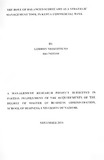| dc.contributor.author | Otieno, Gordon N | |
| dc.date.accessioned | 2013-03-21T09:35:59Z | |
| dc.date.issued | 2010-11 | |
| dc.identifier.citation | MBA Thesis | en |
| dc.identifier.uri | http://erepository.uonbi.ac.ke:8080/xmlui/handle/123456789/14881 | |
| dc.description.abstract | The banking industry in Kenya has been in the upwards trend in terms of development
and growth. This has lead to an increase in the number of banks in the country and
opened an environment for serious competition. The banks have used many strategies to
outclass their competitors and one of the major problems they are currently facing is how
to maintain and successfully manage the different kinds of employees they have.
Kenya Commercial Bank being one of the leaders in the market has not been left out in
the competition. The bank has managed to expand its network not only in Kenya but also
in the entire East African Countries. Despite being one of the leaders in the industry, the
bank has not been exempted from the challenges resulting from competition. It has in the
past witnessed an increased number of employees moving to other competitors due to
poaching and offers of better terms of employment. The bank normally develops
strategies each financial year to enable it meet its financial needs and to work in line with
its mission; to drive efficiency whilst growing market share in order to be the preferred
financial solutions provider in Africa with global reach, and vision; to be the Preferred
Financial Solutions Provider in Africa with Global Reach
The bank has over the years been using the balanced scorecard to manage its employees.
The balanced scorecard is a management system (not only a measurement system) that
enables organizations to clarify their vision and strategy and translate them into action.
The balanced scorecard was developed in the early 1990’s by Kaplan and Norton of
Harvard Business School. Recognizing some of the weaknesses and vagueness of
previous management approaches, the balanced scorecard approach provides a clear
prescription as to what companies should measure in order to ‘balance’ the financial
perspective ( Arveson 1998).
KCB as a banking institution will be the case study for this project. The project will seek
answers on how banks use the balanced scorecard as a strategic management tool. Its results should help other banks to improve their management process and have a
competitive edge on other players in the industry. It will also enable them to remain
relevant in the industry and help them identify the challenges faced by banks in the use of
the balanced scorecard. | en |
| dc.description.sponsorship | University of Nairobi | en |
| dc.language.iso | en | en |
| dc.subject | Kenya Commercial Bank | en |
| dc.subject | Strategic management | en |
| dc.subject | Balanced scorecard | en |
| dc.title | The role of balanced scorecard as a strategic management tool in Kenya Commercial Bank | en |
| dc.type | Thesis | en |
| local.publisher | School of Business, University of Nairobi | en |

